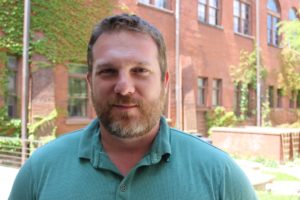Christopher Stoos is a Senior Research Engineer at Southwest Research Institute in Texas, a dad of two and, most recently, a graduate of UW-Madison.

In December 2017, Stoos completed his Master of Engineering in Engine Systems and says the degree allowed him to channel his love for learning and better understand what his customers want.
Some edits were made to the conversation.
Why did you choose to get a master’s degree?
Personally, I love learning and love to challenge myself. Career-wise, it allows for more upward mobility, giving me the education necessary to take the next step or two up the ladder. Lastly, I felt that it was my last opportunity. As the kids get older I’m sure I’ll be spending my evenings shuttling them back and forth from sporting events and school functions. I wouldn’t have time to focus on myself and my education while worrying about theirs. So, I made the plunge and, now that I’m done, I’m glad that I did.
Why did you choose UW-Madison?
I looked around at various options for a master’s degree. Through discussions with co-workers and my own research, I narrowed it down to a few potential schools. It was conversations I had with a program instructor and student that helped me finalize my decision to attend UW-Madison.
How was your experience in your program?
I enjoyed the program and feel that it will benefit me in my career. My career is currently performance/research focused, and though the degree is manufacturing focused, it has helped me gain a better understanding of the decisions made by our customers, and through that, a better understanding of my work.
What did you like best about your program?
The Engine Systems program is very much geared toward the working engineer. This means that my cohort of classmates was made up of highly knowledgeable engineers. You make friends and industry contacts that are indispensable and can draw on their expertise and experience to help you throughout the rest of your career. Those relationships are truly one of the biggest benefits of the program in my eyes.
How did it compare to your undergrad experience?
My undergrad education was kind of a mess. I started at the University of Missouri in the fall of 2001. It was during my first semester there that 9/11 occurred. As a result of that, I joined the US Army reserves after my freshman year. This helped me pay for college, but due to the conflicts in the Middle East, it also required me to leave school several times. Eventually, on my last deployment to Fort Hood, Texas, I started dating my future wife, and decided to stay there. Just over half of my credits from the University of Missouri transferred so I had to repeat a few courses. I finally graduated with my bachelor’s in Mechanical Engineering in Fall 2011, only 10 short years after I started college.
What was the biggest challenge you overcame to pursue your Master’s degree?
The biggest challenge was finding the right balance between school and life, which was not always easy. I was also working full-time during the program, 40-50 hours a week. When I started the program my first son was just about to turn one. My second son was born one week into my second year in the program. When the kids are this young you just want to spend every possible moment with them, which often meant putting off the school work. You pay for it later when you have to stay up all night finishing a project, but it was worth every second.
It was more difficult with big assignments like projects and papers that demanded more time than I could get in the evenings once the kids were asleep. It is impossible to sit at a computer and work on stuff like that with two young children around, because keyboards have a supernatural draw to children, and they MUST push all the buttons on it or they will scream and cry and make you feel awful.
How has your new degree impacted your career?
I just graduated a month ago, so I likely won’t have an answer for that until later in my career. But I know the degree will allow me better upward mobility along with a better understanding of the overall work I do at Southwest Research Institute.
Any interesting facts about yourself?
I haven’t had time to be interesting the last four years. Now that I’m finished with the degree, maybe I can come up with something.